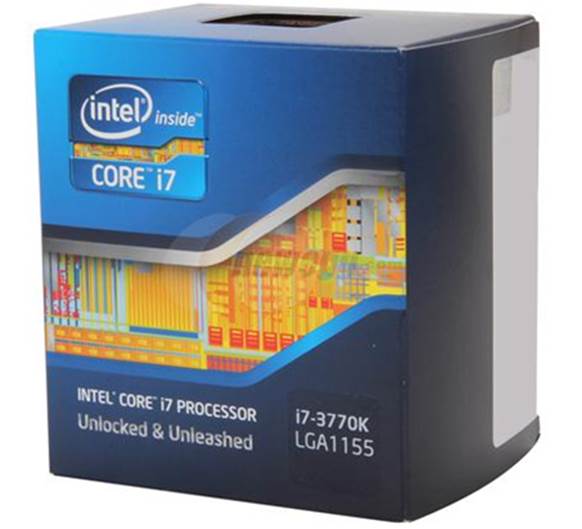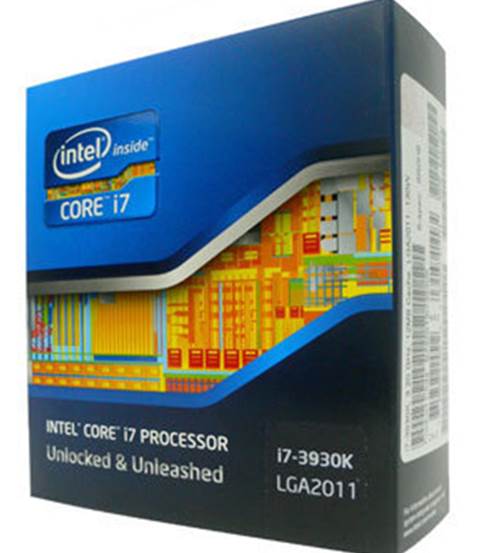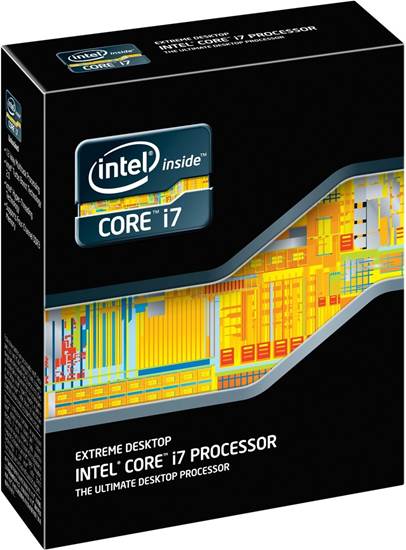Some chips achieve greatness. Others are
born into it. From the moment the i7-3770K was announced, it was clear it was
going to be the most desirable choice of any Ivy Bridge user.

Intel
Core i7-3770K
With four cores, a 3.5GHz clock and 8MB of
cache, it's got supremely high-end specs and the technology to match - its
Intel HD Graphics 4000 GPU is fantastic for desktop use, and although it isn't
up to the most recent games, we expect anyone buying this chip will be
augmenting it with a proper graphics card. Indeed, any weaknesses the 3770K
shows are those that exist with Ivy Bridge as a whole. Although Intel has
treated it as a new generation, there's very little new about it - it's a
die-shrink of Sandy Bridge with slightly improved graphics. That means if
you're coming from a high-end Sandy Bridge chip, you're not going to find much
of an improvement here. If you're not, though, the 3770K looks as impressive in
your system as it does on paper.
As those who understand the serial number
can tell, the 3770K is the multiplier-unlocked version of the 3770, which is
£15 cheaper. It's hard to recommend the latter, though. The ability to
overclock Sandy and Ivy Bridge CPUs is part of what has given then their stellar
reputation, so buying the locked version is really just asking for a big pile
of regret somewhere along the line. Okay, you might know you never plan to
overclock – but for £15, it hardly seems worth trying to save the money,
especially given the hardware's price in the first place.
Not that price is a problem – as it
happens, the 3770K is actually one of the best value chips in Intel's line.
It's more expensive than the chips that perform closest to it, but with only
£25 between it and the older i7-2700K, it's worth spending the extra money for
the technology, even if it's not substantially better performance-wise. Indeed,
we can only think of one reason not to buy the 3770K, and that's the fact that
it's the best LGA1155 chip on the market right now – so unless (and until) a
better one comes out, you'll be left with nowhere else to go!
|
Details
·
Price: $385
·
Socket: LGA1155
·
Clock Speed: 3.5GHz
·
Cache: L3/8MB
·
Process: 22nm
Ratings
·
Quality: 8/10
·
Value: 9/10
·
Overall: 9/10
|
Intel Core i7-3930K
The slowest of Intel's six-core Sandy
Bridge E chips is still one of their speediest models, and it carries the
distinct advantage of being substantially better value than those above it,
coming in under $600. It's still expensive in CPU terms (you could buy a reasonably
good laptop for this amount) but at the high end of the market, it's really the
only Sandy Bridge E processor worth a look if, like most people, you don't have
a bottomless wallet.
In benchmarks, the Core i7 3930K performs
almost identically to the Core i7 3960X, and is only about 8% slower than the
fastest of them all, the Core i7 3970X. Crucially, though it's some $400
cheaper. Do the maths on that and it should be clear quite quickly that it's
disproportionately good value when compared to the high price of the CPUs that
outpace it.
As a Sandy Bridge E chip, it has the
six-core design and a four-channel memory controller (compared to the usual
2-channel design of Sandy/Ivy Bridge). That marks it out as a Xeon chip with
the serial numbers filed off (er, not literally, but you get the point).

Intel
Core i7-3930K
Although a shade slower than the 3960X out
of the box, the 3930K chip is massively overclockable, so anyone who can afford
to risk something in the region of £500 on overclocking can probably beat the
faster chip without much difficulty. It's possible to push Sandy Bridge chips
very close to 5GHz with the right cooling, and this one is no different.
Indeed, the main difference between the two
chips is actually the amount of level three cache, which won't have hugely
noticeable effects. The 3930K's 12MB is already vastly more than most chips, a
3MB difference to the X-model Sandy Bridge E CPUs isn't going to be obvious
during day-to-day operations.
With every factor considered, the advice
we've got to give you is clear: if you're planning to buy a Sandy Bridge E
chip, this is the only one it really makes sense to part with (plenty of) your
money for.
|
Details
·
Price: $645.99
·
Socket: LGA2011
·
Clock Speed: 3.2GHz
·
Cache: L3/12MB
·
Process: 32nm
Ratings
·
Quality: 9/10
·
Value: 8/10
·
Overall: 9/10
|
Intel Core i7-3970X
The fastest desktop CPU available right now
is this: the Core i7 3970X. Released mere weeks ago, it's an update to the
similarly-speedy Core i7 3960X, which has otherwise staved off all competition
for the best part of 12 months. The 3970X is faster, though, but not by a huge
amount.
That's because the chip itself is little
more than the 3960X with an extra 200MHz on the clock. Turbo mode has crept up
from 3.9GHz to 4GHz, which is impressive on paper, but results in very little
difference in the real world. Aside from that, there's no difference between
this CPU and its predecessor. No new technology, the same amount of cache, and
six cores.
Still, it is faster than the 3960X, and you
can overclock it yet further if you've got the cojones (and cooling
capabilities) to do so, which means that anyone who wants a slice of super-fast
desktop performance can do no wrong by choosing the 3970X.

Intel
Core i7-3970X
But once you put its speed to one side, the
chip actually starts to look a little weak. It runs on the Sandy Bridge E
platform (the E is for Enthusiast) which means it's not even using the latest
technology. Ivy Bridge E is due in Q3 2013 - although it will use Socket
LGA2011 as well, so at least you'll be able to upgrade. Irritatingly, despite
being sold as six core, Sandy Bridge E chips actually contain eight cores, even
though you can never get to two of them – underneath, they're just Xeons with
two cores disabled.
Price-wise, it comes in at an almost
identical cost to the 3960X, so expect to see a few discounted versions of the
latter around. In terms relative to its performance, that makes it good value.
However, if you start to look at it in terms of performance against other Intel
chips, it looks decidedly less appealing. Compared to the Ivy Bridge Core i7
3770K, it's more than twice as expensive for each performance point. It
benchmarks just under 40% better, but it costs three times the price. You can't
deny its position as top banana, but it's also bad value any way you slice it.
That said, at this level value would seem
to be the last thing on anyone's minds - and it can't be beaten on performance.
Therefore, if you can afford it, there's no real reason not to treat yourself
to this absolute powerhouse of a CPU. Happy benchmarking!
|
Details
·
Price: $1,079.99
·
Socket: LGA2011
·
Clock Speed: 3.5Ghz
·
Cache: L3/15MB
·
Process: 32nm
Ratings
·
Quality: 10/10
·
Value: 5/10
·
Overall: 9/10
|